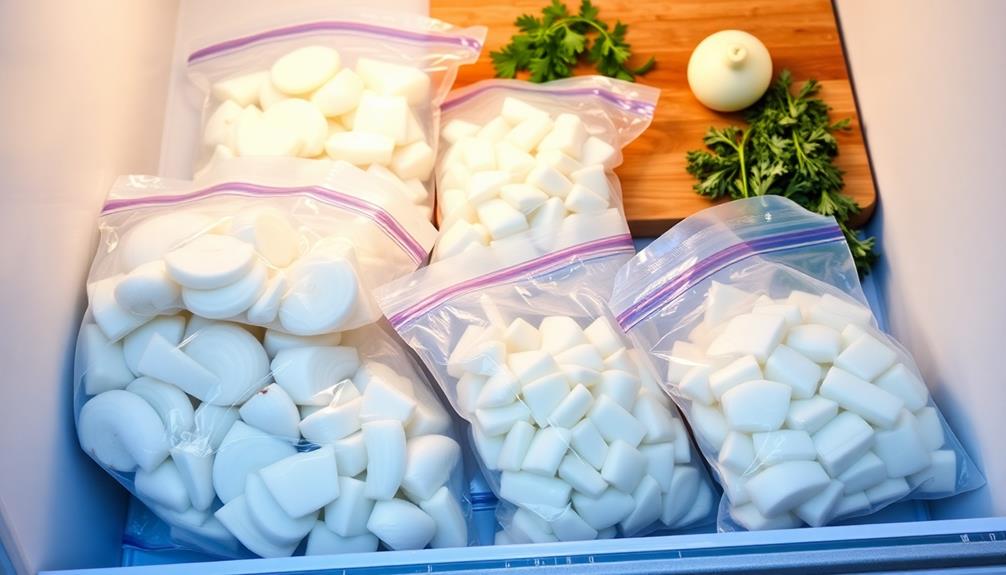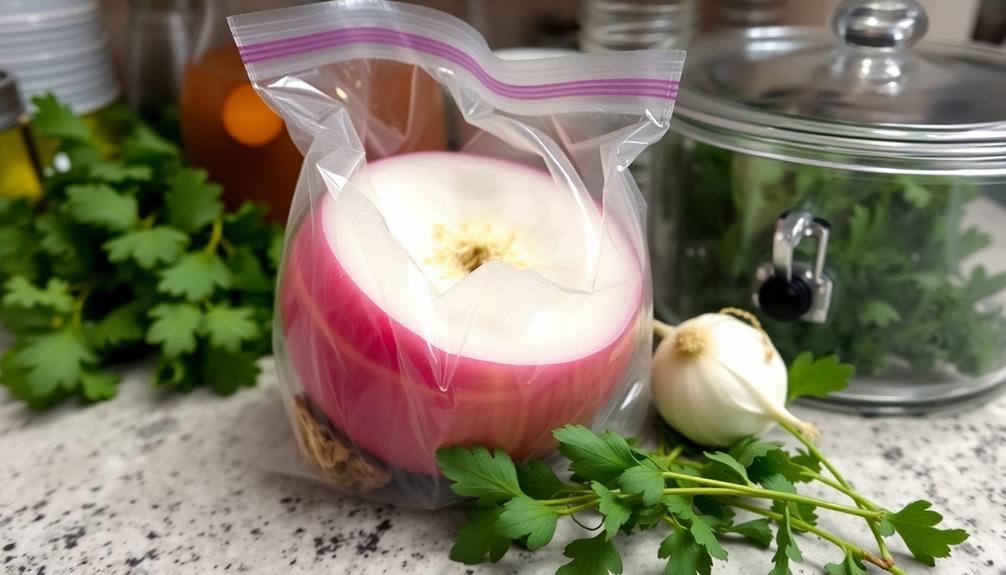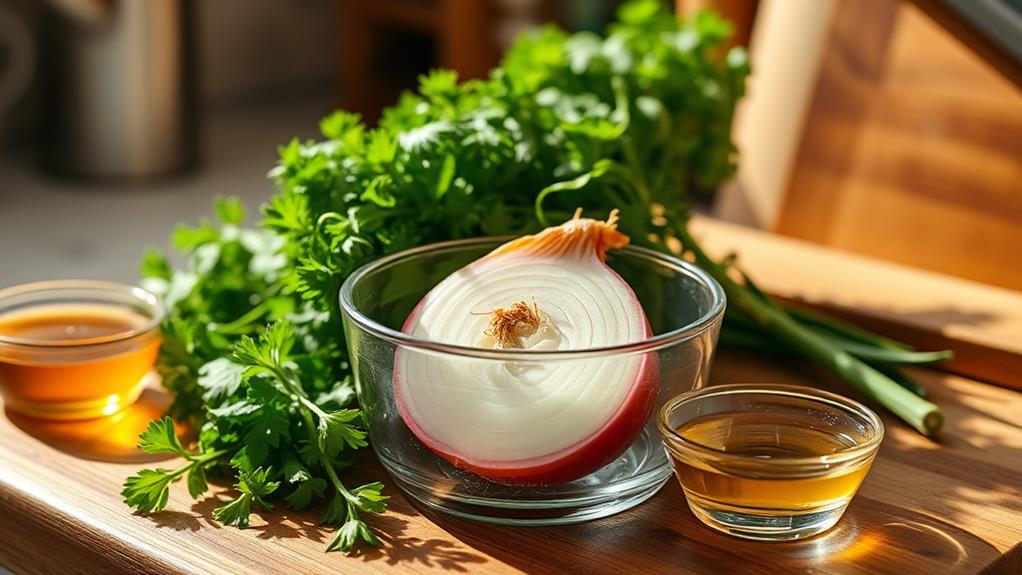To keep cut onions fresh and flavorful, store them in airtight containers in your fridge. Glass containers work best as they prevent odor absorption. Always place them away from strong-smelling foods and make sure the area is cool and dry to avoid spoilage. If you have leftover onions, consider freezing them in airtight bags for several months. Regularly check your stored onions for signs of spoilage, like a mushy texture or bad odor. With a few smart storage methods, you can greatly extend their life. Explore more tips to enhance your onion storage strategy!
Ideal Storage Conditions
When you store cut onions, it's essential to use the right conditions for ideal freshness. First, always opt for an airtight container, as this helps maintain their taste and texture for about a week. Glass containers are a great choice since they prevent odor absorption and keep your onions well-preserved.
Utilizing advanced storage techniques, such as proper sealing, can help enhance the longevity of your food items, similar to how expense management apps streamline financial organization.
Make sure to keep your cut onions away from strong-smelling foods in the fridge. This separation helps avoid flavor contamination, ensuring your onions stay delicious. The storage environment should be cool and dry; excess moisture can lead to spoilage and unpleasant odors.
If you want to extend shelf life beyond one week, consider freezing diced onions. Just make sure you package them properly to prevent freezer burn. This way, you can have cut onions handy for your recipes without worrying about them going bad too quickly.
Best Practices for Refrigeration
To keep your cut onions fresh, store them in an airtight container in the refrigerator.
This method helps maintain their quality for up to a week and supports effective management of spending by reducing food waste.
Airtight Container Usage
Storing cut onions in an airtight container is crucial for keeping them fresh and minimizing odors in your refrigerator.
Using a glass airtight container is your best bet, as it prevents onion odors from lingering in your fridge and allows for easy labeling. When you place your cut onions inside, make sure the container isn't overfilled; this guarantees proper airflow, which helps maintain their texture.
Regularly check your cut onions for any signs of spoilage, such as a soft texture or unpleasant smells. If you spot any, discard them immediately to prevent spoilage from spreading.
If you find you have leftover diced onions that you won't use within the week, consider freezing them in an airtight bag or container. This method can keep them fresh for several months, giving you flexibility in meal preparation.
Ideal Storage Duration
Cut onions can last up to a week in the refrigerator if you store them properly. To keep your cut onions fresh for as long as possible, make sure you follow some best practices for refrigeration.
Start by placing them in an airtight container to maintain their freshness and prevent odor absorption. Glass containers are a great choice, as they're easier to clean and do a better job of keeping strong odors at bay.
Here are some quick tips for ideal storage duration:
- Seal cut onions tightly to prevent moisture absorption and oxidation.
- Keep them away from strong-smelling foods to avoid flavor transfer.
- If you need to store them for longer, consider freezing diced onions, which can last for several months.
- Check your onions regularly, discarding any that show signs of spoilage.
Freezing Cut Onions

Freezing chopped onions is a smart way to prolong their freshness and reduce waste in your kitchen. When you freeze cut onions, they can last for several months, far exceeding the typical two weeks you'd get in the fridge.
To guarantee quality, package your chopped onions in airtight containers or freezer bags, removing as much air as possible to prevent freezer burn. Using a budgeting app like YNAB (You Need a Budget) can help you save money for fresh ingredients.
It's important to note that whole onions aren't suitable for freezing, as their texture will degrade. Instead, stick to chopped or diced onions for the best results.
When you're ready to use them, just remember that thawed onions are best for cooked dishes. The texture mightn't hold up well for raw consumption after freezing, so save them for soups, stews, or sautés.
Don't forget to label your containers with the date you froze them. This simple step helps you track freshness and guarantees you're using them within the recommended storage time.
Signs of Spoilage
Knowing how to identify spoilage is essential for keeping your kitchen safe and your meals delicious.
Properly categorizing and managing ingredients can help minimize waste and keep your cooking efficient, much like streamlined bookkeeping processes for small businesses.
When it comes to cut onions, you should regularly check for specific signs of spoilage to avoid using anything unsafe.
Here are some key indicators to watch for:
- Soft or mushy texture: If your onions feel squishy, they're rotting and should be tossed immediately.
- Dark spots or mold: Any discoloration or fuzzy mold on the surface means the onion is decaying and unsafe to eat.
- Strong, unpleasant odor: A foul smell is a clear sign of spoilage; if you notice this, it's best to discard the onion.
- Sprouting: While sprouted cut onions can still be used for cooking, their freshness is compromised, so use them soon.
Common Storage Mistakes

You mightn't realize it, but exposing cut onions to direct sunlight can cause them to spoil much quicker.
To enhance freshness, it's important to understand the right storage techniques, as outlined in clear payment terms.
Using the wrong type of container can also trap moisture and odors, leading to mushy, less flavorful onions.
Let's explore these common storage mistakes so you can keep your onions fresh longer.
Direct Sunlight Exposure
Direct sunlight can be a hidden enemy when it comes to storing cut onions. When you leave cut onions in direct sunlight exposure, you're promoting conditions that lead to spoilage.
The heat and moisture from sunlight accelerate decay, causing your onions to lose their flavor and texture. Not only do they become less palatable, but they can also dry out, making them unappetizing for your meals.
To keep your cut onions fresh and safe, remember these key points:
- Always store onions in a cool, dark place.
- Use airtight containers to prevent moisture loss.
- Check for signs of mold or bacteria regularly.
- Ideally, place them in the refrigerator for up to a week of freshness.
Improper Container Use
Storing cut onions can be tricky, especially when it comes to choosing the right container. One common mistake is using plastic bags or containers that trap odors. This can lead to an unpleasant smell in your fridge that permeates other stored items.
Instead, opt for breathable options like glass containers that allow airflow, reducing moisture buildup and the risk of mold. Airtight containers might seem like a good idea, but they can restrict airflow, creating a damp environment that isn't ideal for cut onions.
Additionally, using non-glass containers can result in odor absorption, making it difficult to store other foods later without lingering onion smells.
Don't forget to label your containers with storage dates. Failing to do this can lead to confusion about how fresh your cut onions are, potentially increasing waste.
Finally, make sure to check your cut onions regularly for signs of spoilage. Neglecting to do so could result in consuming spoiled or unsafe food.
Creative Storage Solutions
How can you keep cut onions fresh and odor-free while being eco-friendly? You can use creative storage solutions that not only minimize waste but also enhance freshness. Here are some effective methods:
- Repurpose recycled glass jars (like pickle or Parmesan cheese jars) to store cut onions, reducing plastic use and supporting sustainable practices.
- Utilize the face-down bowl method by placing cut onions in a bowl upside down. This technique contains odors while allowing for air circulation, keeping them fresher longer.
- Freeze diced onions on plastic lids or in ice cube trays; this makes meal prep quicker and prevents spoilage.
- Label storage containers with a Sharpie to easily identify different onion varieties or uses.
Store cut onions in a glass container with a tight-fitting lid in the fridge. This keeps odors at bay and maintains freshness for up to a week.
Conclusion
So, you've learned how to store cut onions and keep them fresh, but isn't it ironic that despite all these tips, they might still end up forgotten in the back of your fridge? Just like those half-finished projects or unfulfilled resolutions, onions can easily slip from your mind. Embrace the challenge of remembering your produce, and maybe you'll find that staying organized isn't just about keeping onions fresh—it's about savoring every moment, even the ones that might stink!



